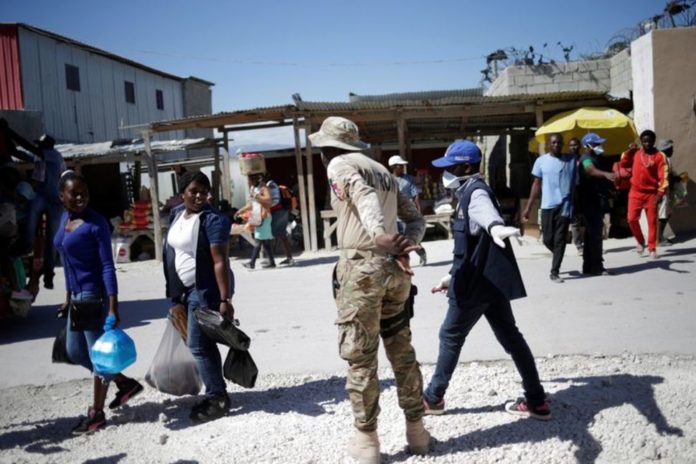
It is surely not a question of “if” the COVID-19 coronavirus pandemic will eventually spread to Haiti, but “when.”
Nonetheless, in an attempt to at least delay its arrival, on Mon., Mar. 16, 2020, at midnight, Haiti closed its 224-mile-long border with the neighboring Dominican Republic, where (at press time on the evening of Mar. 17) there are 21 confirmed cases of the disease and one death. But every day brings new cases.
There are four official border crossings between Haiti and the DR, to which Public Health officials have been dispatched.
Haiti said it would stop all flights from Europe, Canada, the Dominican Republic, and Latin America.
“Only products can enter Haiti,” said the new Interior Minister Audain Fils Bernadel. “The personnel transporting the goods must be subjected to screening tests.”
To date, about 200,000 people in 165 of the world’s 195 nations have been infected by the virus, which can cause deadly pneumonia-like symptoms. Already, over 8,000 have died worldwide.
Haiti also said it would stop all flights from Europe, Canada, the Dominican Republic, and Latin America to its international airports in Port-au-Prince and Cap Haïtien and only receive planes from neighboring Cuba and the United States. At press time, those two countries had seven and 6,499 confirmed COVID-19 cases respectively.
Nonetheless, on Mar. 17, flights from the Bahamas and Turks and Caicos also continued to fly into Cap Haïtien, the nation’s second largest city in the North. The Bahamas just announced its first coronavirus case on Mar. 15.
On Tue. Mar. 17, Jetblue, one of the principal airlines serving Haiti from the U.S., stopped its planes from flying to the country. “Officially, we have canceled all of the flights to Port-au-Prince for the foreseeable future with no resumption date,” said JetBlue spokesman Derek Dombrowski.
On Mar. 15, Haiti’s Communications Ministry tweeted: “Flights from the USA (NY, Miami …) are being evaluated. However, all travelers from the USA must have a document proving that they have carried out a test before arriving in the country.”
According to the Miami Herald, Jetblue suspended its flights because of this supposed COVID-19 test requirement for passengers. Nonetheless, the Herald also notes that neither American Airlines out of Miami nor Spirit Airlines from Ft. Lauderdale stopped their flights to Haiti on Tuesday.
There is a severe shortage in the U.S. of COVID-19 test kits, which are mostly administered to the severely ill, who would not be traveling to Haiti. Therefore, it is unlikely any of the passengers arriving in Haiti from the U.S. on Mar. 16 or 17 had to provide the proof of a negative COVID-19 test.
Haiti is abysmally unprepared to handle another epidemic.
The U.S. Embassy in Haiti added to the confusion. “Flights between Haiti and the United States will continue,” it wrote on its American Citizen Services Facebook page on Mar. 15. “The Government of Haiti stated that all travelers from the U.S. must have a document showing that they have tested negative for coronavirus before boarding. The Government of Haiti did not specify what proof passengers should present and has not yet provided instructions to airlines. The Government of Haiti will continue to conduct health screenings on arriving passengers.”
Haiti is abysmally unprepared to handle another epidemic, having struggled over the past decade to overcome a cholera outbreak unleashed in the country in October 2010 by Nepalese United Nations military occupation troops, whose disease-laced sewage polluted the headwaters of Haiti’s largest river. As a result, some 10,000 Haitians died from the disease, and close to 900,000 were sickened.
Due to neoliberal austerity measures which Washington and its allies have forced on Haiti over the past three decades, the country’s hospitals and clinics are under-staffed, ill- equipped, and crumbling. Often, they lack even electricity. According to a 2017 World Bank report, Haiti spends next to nothing per capita on healthcare. Compared to $180 in the Dominican Republic and $781 in Cuba, Haiti spends only $13. And that was before the political and economic crisis that has gripped the country for the past 18 months.

Today, for Haiti’s 11 million people, there are a mere 200 hospital beds available for COVID-19 patients in several facilities around the country. Their location is being kept secret for security reasons, Haiti’s Health Minister Marie Greta Roy Clement said.
On Mar. 17, Haiti also closed its consulates in France, French Guyana, Guadeloupe, Martinique, Saint Martin, and Dominica, and its embassy in Ottawa, Canada. The Foreign Ministry also ordered all its other embassies and consulates to open only part-time, at the discretion of their chief of mission.
On Mar. 16, Haiti’s new de facto prime minister, Joseph Jouthe, held a press conference to announce the launching of a campaign, in conjunction with the National Federation of Haitian Mayors, to inform the Haitian public about the dangers of the coronavirus and how to minimize one’s chances of infection.
According to a Mar. 16 story by Sandra Lemaire and Matiado Vilmé, reporters for Voice of America Radio (VOA), street vendors in the teeming Croix-des-Bossales market in downtown Port-au-Prince had “not heard much about the coronavirus pandemic.”
One vendor told the journalists that drinking kleren, Haiti’s sugar-cane-based moonshine, can keep the virus at bay. “I heard the virus doesn’t like hot climates nor strong alcohol, so that’s our protection,” she told them.
“They told us we shouldn’t touch our faces, but after moving merchandise, sometimes we sweat, and out of habit, we wipe our forehead (with our hand),” another market woman told the VOA. “How are we supposed to avoid doing that?”
Haitian social media groups, primarily on WhatsApp, are filled with many macabre jokes about the pandemic. “Coronavirus already came to Haiti,” said one, “but it died of hunger.”
Jouthe said the Haitian government has tested several people for the coronavirus, but so far the tests have all come back negative. He also said that the authorities currently have 18 people being held in quarantine.









